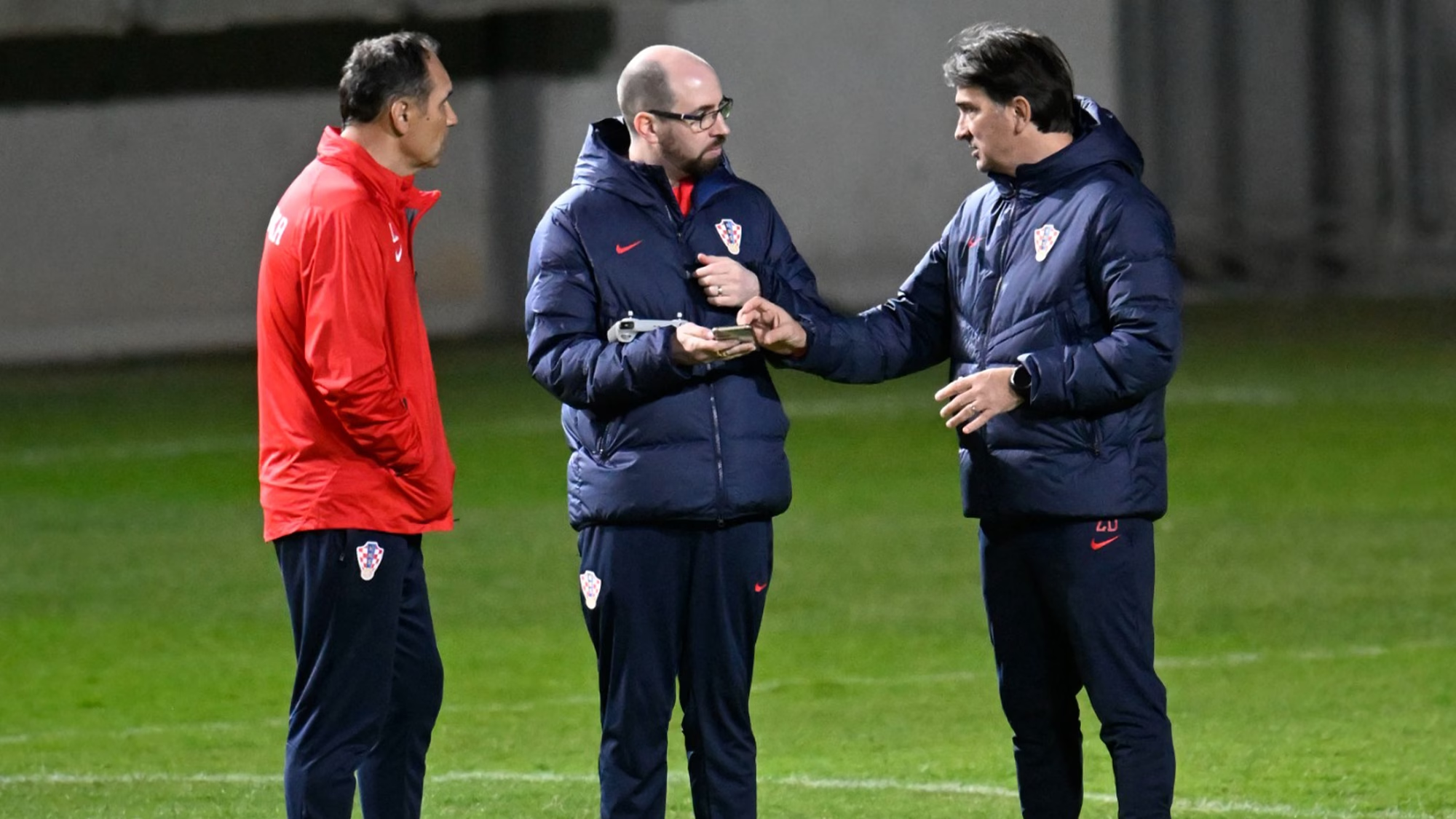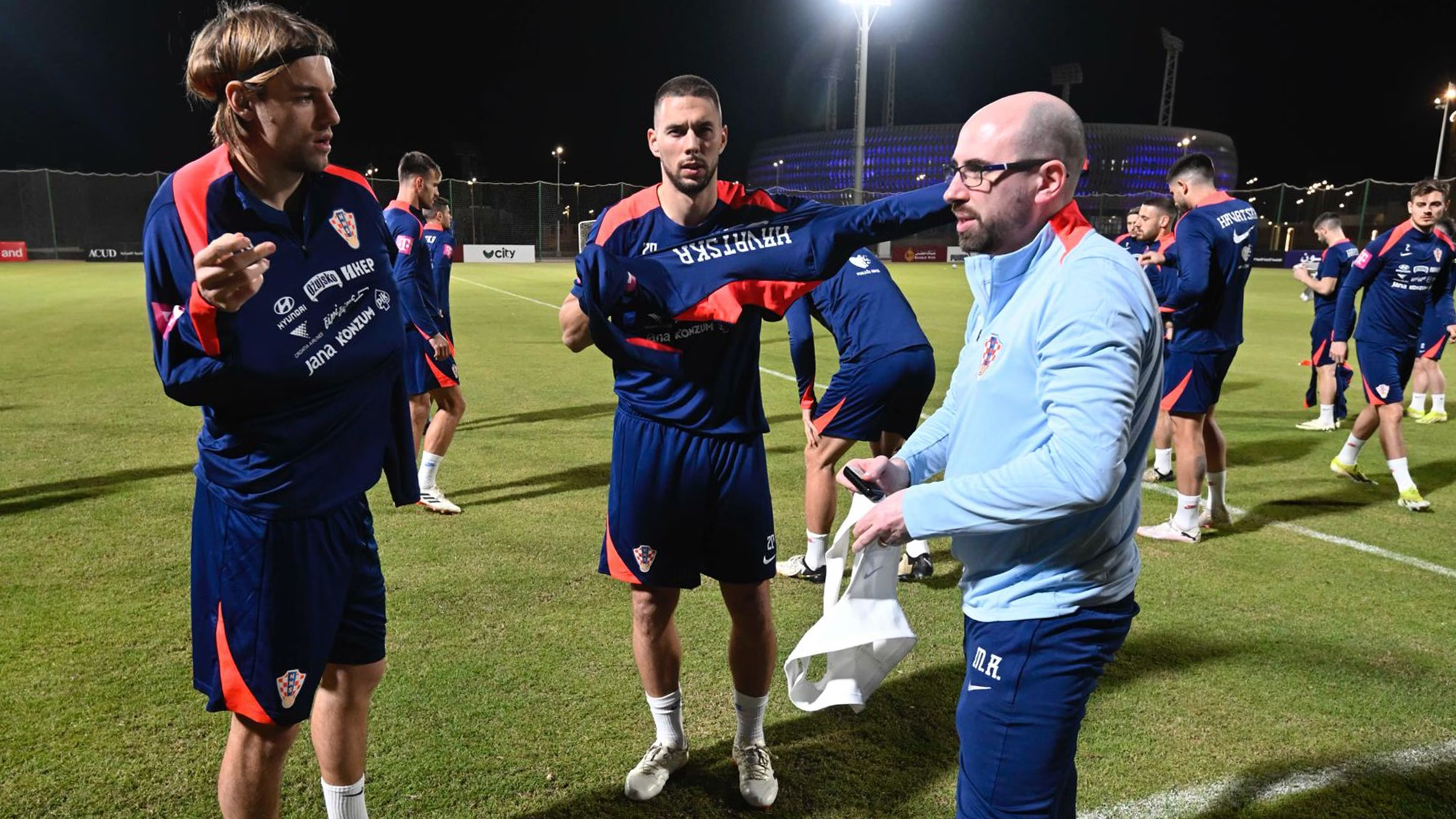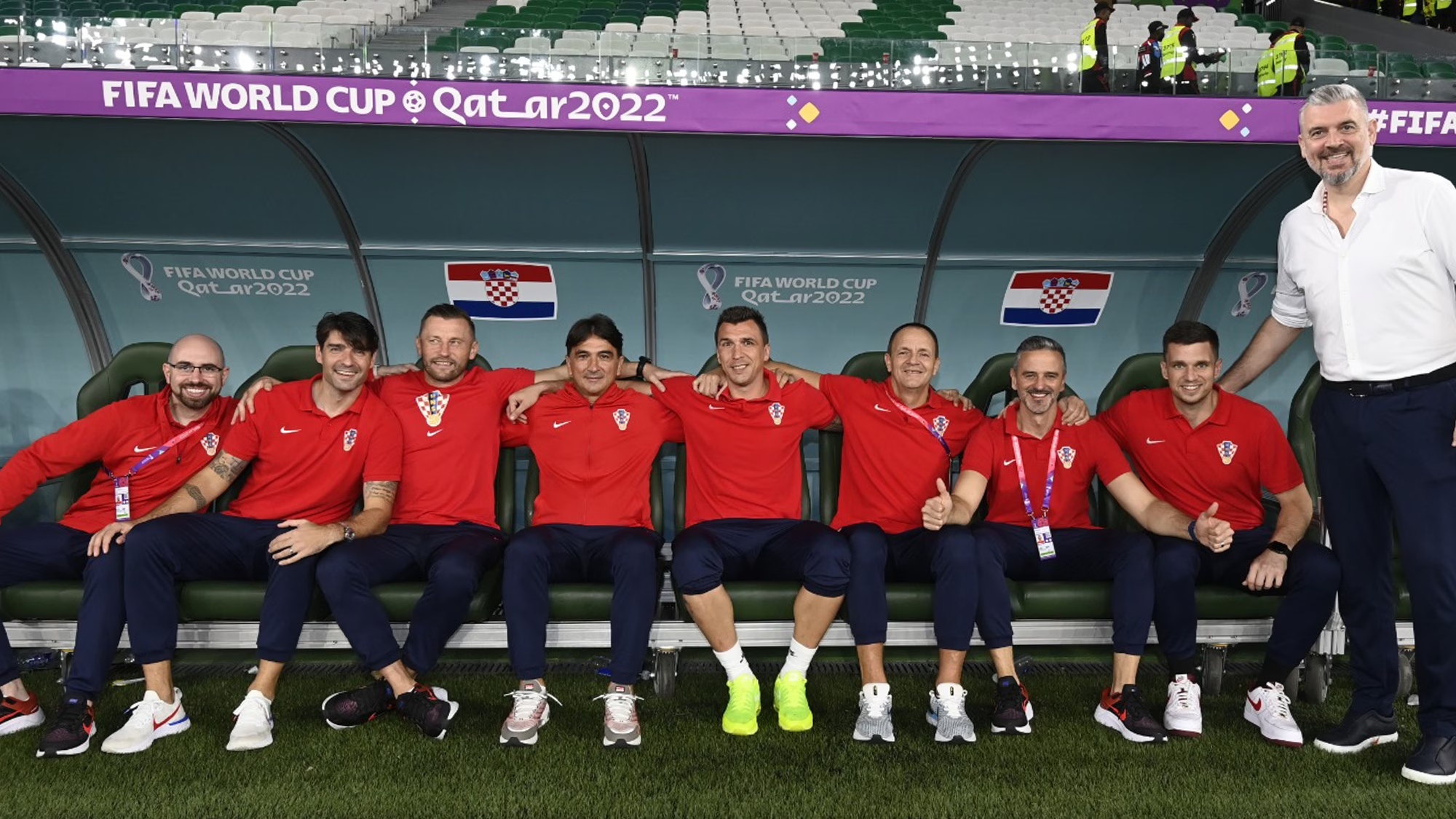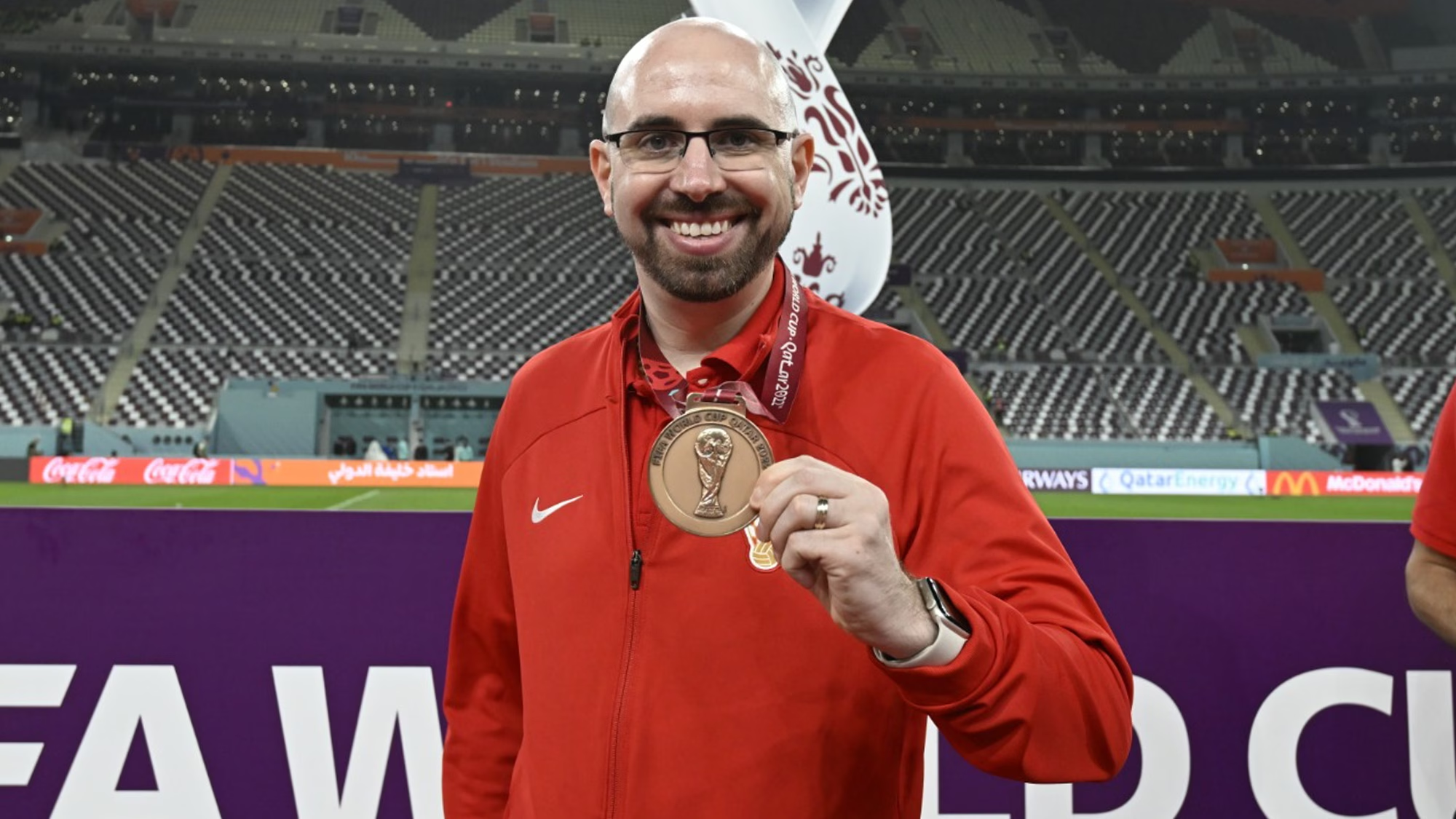News

The Dons Analyst at the Euros
As well as supporting Scotland, the Dons staff will be keeping a close eye on Croatia this summer as one of our own is working with their national team. Marc Rochon joined the Pittodrie backroom team in February as Head of Performance Analysis whilst combining his work for the Croatian National side, where he has a World Cup runners-up medal and a bronze medal from a third place finish under his belt. As Marc explains, his roots though are very close to home.
“I grew up at the Seaview Hotel in John O’Groats! My early years were spent there before we moved to just outside Inverness. I also lived in Edinburgh and then moved down south when my parents moved there for work.
“Fast forward, 18 years on, I started working at Southampton as an intern while doing my undergraduate course at university. I worked in the performance analysis and sport science department at St Mary’s for two years before taking an internship at Spurs. There I worked with the development squad for a year and then got a full-time job at Portsmouth, so I moved back to the south coast and lived there for three or four years. I worked with the academy all the way up to the first team. After I was offered a job in the middle-east and that’s where I first met Zlatko Dalic, who’s now the Croatian national team manager.
“We worked together for three-and-a-half years and had a good run. We won the league, we won the domestic cups and reached the Asian Champions League final. When he left to join Croatia, I sent him a message saying, ‘Best of luck. If you’re needing anything, please let me know.’
I get one back saying, ‘Well we don’t have an analyst. Could you help me out?!’ So I joined him in November 2017. Off the back of that, we had the run in Russia, reaching the World Cup final.
“I worked solely with Croatia for a while after that. We had the Euro 2018 run and then the next World Cup happened and we reached the semi-final again. We also had the Nations League final recently, so we’ve had a pretty successful time together.

“Alongside all that, I joined West Ham in the summer of 2021, working within the first team analysis department when we qualified for Europe two years on the bounce, reaching the semi-final of the Europa League and then winning Europa Conference League. I haven’t had a bad few years! It has been a real honour and a privilege and I am lucky to have been involved in all these teams.”
The job may sound very glamourous, but any video analyst will tell you that the role is incredibly demanding, working all hours of the day and long into the night, in a stressful environment, in the hope that the work you do can make the difference in those marginal games. So what does his job actually involve?
“I’m working with top level professional players. I’m not teaching them how to play football, I’m trying to give them bits of information that will help them win. I’m watching the opposition and watching us and working out where we are strong and what we are really good at, and where the team we’re playing might not be as strong. We try to match up our strengths to their weaknesses to make sure we can benefit the most from the players we put on the pitch.
“It’s all about making sure we’re fully prepared for the game to give us the best possible opportunity to win the match. It involves being able to tactically analyse the opposition as a team and as individuals. It’s also about preparing the team during training as well – we analyse our own training sessions so we can see what’s worked and hasn’t worked, what we need to work on.
“You have to build a relationship with the players and the staff. If there’s no trust within that relationship, whatever you are telling them, they’re not going to believe you. You have to have a level of trust and understanding between players and staff, then as that develops, people begin to trust you more and more and the work gets done quicker.

“When I was working with Peter, he trusted a lot of what I was saying so there was little time wasted. I would explain something with one or two examples and then we were up and running and working towards a collective goal. Having that level of trust and understanding and that clarity of thought and clarity of information is key to being able to perform the role and as a team.
“Since I’ve joined Aberdeen, it’s been a whirlwind few months! I have really enjoyed coming into the club and I also really like Aberdeen as a city and as an environment to work in. I’ve really enjoyed working with Peter, Sammy and all the other staff. They’re a really good group of people, they’re very understanding and helped integrate me into the club and the area. I am very excited to see what happens next season.”
Croatia have proved themselves as one of the pre-eminent tournament teams of recent years, but what is it about them that enables them to step up when it really matters?
“The big thing about the Croatian team, like Aberdeen, is that it is a giant family. We are all in it together, pulling in the same direction. It’s a supportive environment. Everyone is backing each other up, everyone is working together towards the same goal. If something is wrong, someone will tell you but they do it in a constructive way – ‘What can we do to make it better, how can we help’? That’s a major reason why the team progresses into the latter stages of major tournaments.
“In every competition, no-one has ever had us down as one of the favourites and yet we have reached the final and semi-final of the World Cup. What is making the difference? Admittedly they have had some top players but not the world superstars, so why has it been so successful? It comes down a lot to the camaraderie and the willingness to work with each other and support each other and push each other to be that bit better and go that bit further.
“As you get into the latter stages of the competition, we are all working hard. There is an attitude of, ‘It needs to happen so lets get it done.’ There is no dilly-dallying around things. It’s just a case of, ‘We need to do that now.’
“The players and the staff have an understanding of how long things take and how much needs to go into these things. When you get to these moments, you don’t consider outside influences. All you are focusing on is what is going to impact on our result.”
The World Cup final is the pinnacle of the game and Croatia were there in 2018, a remarkable experience for the entire group.
“It was crazy. Looking back, I realise how massive it was. But in Moscow itself, I was literally in a hotel room, and a meeting room, and a training pitch – that is all I saw. You get a feel for the buzz of what is happening, but from the match preparation point of view, it wasn’t until we got to kick off that it really hit me, because we had prepared everything the same way we would every game.
“We prepared the team meeting the same way, we prepared the players the same way, training was the same. We did not over-egg things because it was a big enough occasion in itself. You don’t need to that. We continued with the same process and tried to avoid putting any extra pressure on the players. But on the matchday itself, the experience was unbelievable, something I never thought I would experience in my lifetime. Being there was just phenomenal and overwhelming at times during certain moments in the game. I am grateful to have been able to be a part of this Croatian team experience.
“The result did not go the way we wanted it to but we were pushing ourselves, not even beyond our limit, it was beyond the next limit after that! I realise I was very lucky to be doing that job, very few people in history will get to do that and as far as I am aware, I’m the only person who has worked for a World Cup Final Team from Scotland. You just don’t expect to be part of that when you go into football in the beginning, you only ever dream you are going to do something like that.
“And as a Scotsman, I will always remember the World Cup semi-final in July 2018. My position was just behind the press box. I am normally very calm during games but on this occasion, at the end I stood up celebrating and was shouting and screaming at the top of my voice. As you can imagine, as it was a World Cup semi-final, there was a huge English media presence there, and I just remember in unison they all turned round at the same to give the look of, ‘You’re an English sounding guy celebrating, what are you doing?!’ As much as my accent is English, although I have always very much considered myself Scottish.
“The homecoming in Zagreb is something I will never forget. The open top bus parade through the city took nine hours to get from the airport to the city centre which is normally about a 45 minute journey. They estimated there was around 550,000 people lining the route.”

Croatia play North Macedonia in a warm-up for the Euros on June 3rd. Will there be any special instructions on how to play against the opposition centre-forward?!
“Bojan and I have been speaking about it for the last few months! He’s looking forward to playing us in Rijeka. I look forward to saying hello before the game and then hopefully commiserating with him afterwards! He’s a great guy to work with and we get along great around the training ground. I really enjoy his presence and company.
“We need a tough build up game because at the Euros, there are no easy matches in our group. It is going to be very difficult there. Italy are the reigning champions and we played Spain in the Nations League final. They’re two very strong teams and then Albanians with Ylber Ramadani have had a good qualification campaign. If you look at the players they’ve got and the ability they have within the squad, they have a very good team with a very high level of players who are still developing. I would say we have the toughest group, especially in terms of FIFA rankings. I think Spain, Italy and ourselves are all in and around the top 10 FIFA World Rankings.
“Hopefully it is a Croatia v Scotland final! I have to be honest and say I struggled a bit emotionally when the two teams met in the last Euros at Hampden, especially when I heard the national anthem because I am old enough to remember how long it had been since Scotland had last qualified for a major competition in 1998. I was watching Scotland qualify with the Croatian team because we were preparing to play Sweden the next day. All the players congratulated me. It was a lovely moment.”
After the Euros, Marc will be back in harness at Cormack Park, where there is much to be done, as he explains.
“We are building the department up again. There has been a lot of change over the last year, so we are putting people in positions. I have confidence in the guys who are in the building when I am away and I am in constant contact with them. I am looking forward to having more contact with Jimmy Thelin and the staff who are coming in and looking forward to seeing what we can do together next season.”

Everyone at Aberdeen wishes Marc and Croatia all the very best this summer in Germany.
(Please note that all images used in this article are credited to Drago Sopta – HNS photographer).
